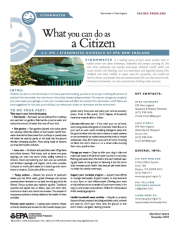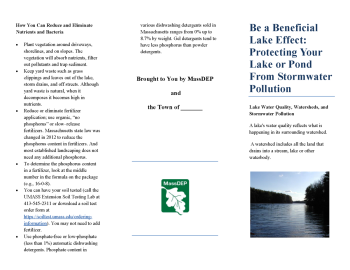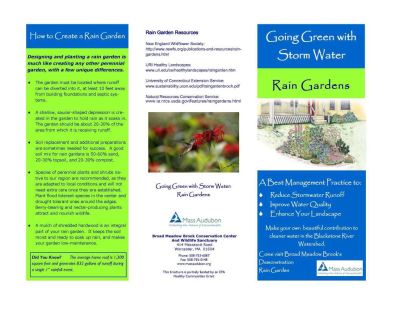Residents
We need every resident to do their part to reach our goal of clean healthy waterways. The following tips will help you prevent stormwater pollution from your home.
What you can do as a resident
| Beneficial Lake Effect
|
Pet Waste Belongs in the Trash!You hate stepping in it. And fish hate swimming in it, too! When you walk your dog, make sure to carry a plastic bag with you so that you can pick up the waste and dispose of it properly. Flushing is the best disposal method (don’t flush the plastic bag), but you can also throw it in a trash can. Do your "doody" in both public areas and in your yard.When you walk your dog, always remember your doggy bag. You can find Dog Waste stations at several parks around Town. We have six pet waste stations in Town at Heard Farm (3), Cow Common (1), Greenways (1), and Sedgemeadow (1). Doody Calls is contracted to pick up waste from each of these stations every week. Click Here for a map of these locations.
| 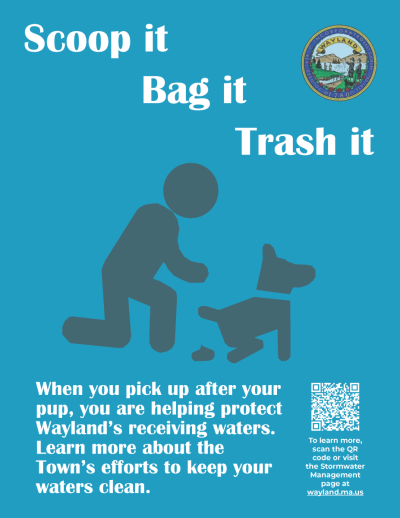 |
Yard WasteIn the Spring, bag your grass clippings and bring them to the Transfer Station, with the required sticker, and in the Fall, do this again with your leaves. Even better, compost grass clippings and fall leaves to make a natural fertilizer for your garden. But whatever you do, don't dump them in a brook or storm drain, and don't leave them on the sidewalk! Click Here for more information about the Transfer Station.Fall leaves and yard waste can cause pollution and flooding when dumped or stored near wetlands, waterways or stormdrains. Click Here for more information about yard waste disposal.
| 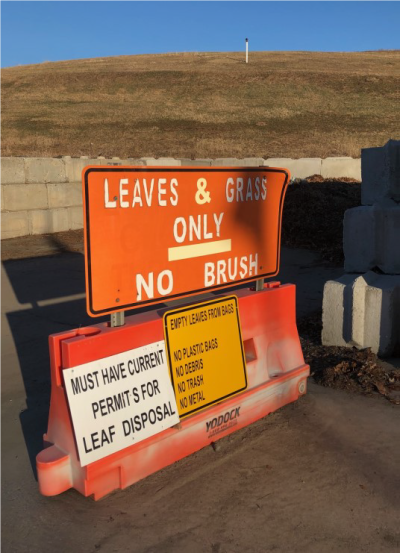 |
Lawn Chemicals and FertilizerAccording to experts, most homeowners over-fertilize their lawns. If you use too much fertilizer, the excess will just wash away in the next rain, polluting our waters.Test your soil and read the label before you apply fertilizer. If you use too much fertilizer, the excess will just wash away in the next rain, polluting your local waterways. Use fertilizers sparingly and sweep up driveways, sidewalks and walkways. The University of Massachusetts has a handy guide on how to test your soil to see if you need to fertilize. Click Here for more information.Use fertilizers sparingly and sweep up driveways, sidewalks and walkways. Test your soil and read the label before you apply fertilizer. Choose to use an organic, long-lasting fertilizer in the Fall and corn gluten in early Spring. Corn gluten is a pre-emergent weed control and fertilizer.
|  |
Household ChemicalsIf you stop to think about it, your home is full of chemicals, such as cleaners, medicines, pesticides, weed and bug killers, and old paint, just to name a few. When you're cleaning out the garage, it might be tempting to pour those chemicals down the toilet, sink or the storm drain, but don't!The Massachusetts Department of Environmental Protection has created a website where you can find a household hazardous waste disposal facility that is convenient to you. Click Here to find a facility.
|
Pool CareDo you know how your eyes can burn after too much time in the chlorinated water of a swimming pool? Imagine how that feels for fish and frogs! Pool owners should stop chlorinating as soon as they know they're going to drain the pool, and drain the water on the grass rather than directly into a waterway.For more tips, check out this brochure from the Massachusetts Department of Conservation and Recreation.
|
Septic SystemsSeptic Systems can pollute public streams and water resources if not maintained properly. The Wayland Board of Health recommends regular inspections. Click Here for more information. | 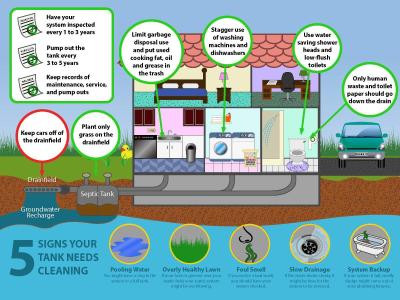 |


